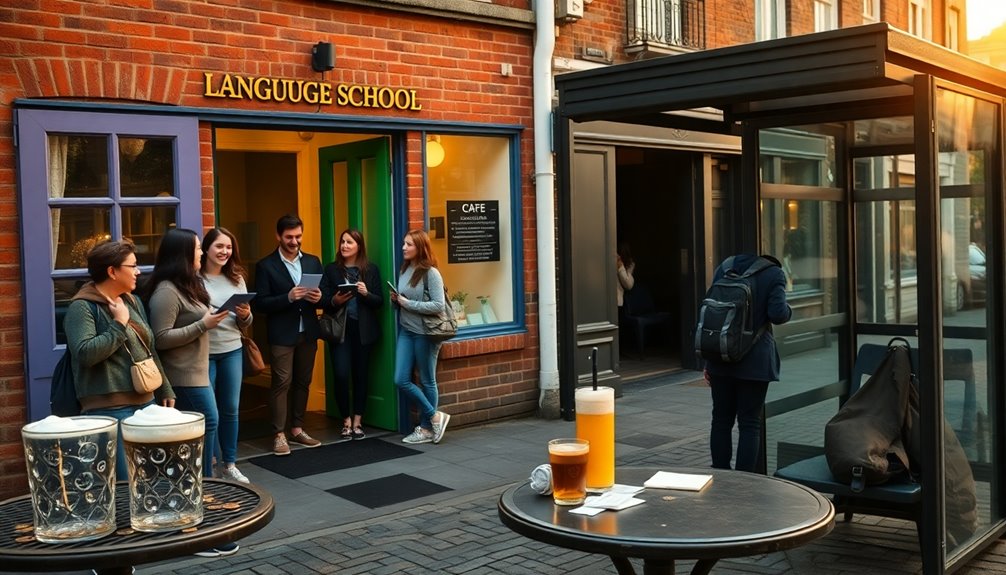
You’ll typically pay €150–€700 per week for English courses in Ireland, depending on course type and provider, plus registration or exam fees. Expect rent and utilities from about €400–€1,200 monthly (city-dependent), groceries, transport and insurance of €200–€400, and books or materials around €30–€80 per course. Part-time work can help cover costs and scholarships exist. Keep a realistic monthly budget of roughly €1,200–€2,200 if you want a comfortable stay — keep going for detailed tips and options.
Tuition and Course Fees for English Programs in Ireland
Tuition for English programs in Ireland varies widely depending on the type of course, provider and location, so you’ll want to compare options rather than assume a single price. You’ll find budget-friendly short intensives and premium long-term courses, so pick based on how much independence you want and the English program quality you expect. Check if fees include materials, exams or extracurriculars, and align course duration with your travel or work plans. Look for transparent pricing and student reviews to judge value, plus accreditation that signals consistent teaching standards. If you crave flexibility, choose modular programs or pay-as-you-go lessons. With clear priorities on quality and timing, you’ll control costs while maximizing learning and freedom.
Housing and Accommodation Costs for Students
Where you live in Ireland will heavily shape your rent—Dublin is pricier than smaller cities and towns. You’ll also want to compare student halls pricing versus private rentals to see which fits your budget. Don’t forget to factor in utilities and extras like internet, laundry, and deposits when calculating total monthly costs.
Rent by City
Rent costs vary a lot across Ireland, so you’ll want to budget differently depending on the city you pick. You’ll notice cultural differences influence neighborhood vibes and how the rental market operates; bigger cities mean more options but also more competition. Think about mobility, nightlife, and how much independence you want.
- Dublin: highest rents, lively scene, easy transport
- Cork: slightly cheaper, creative atmosphere, cosy neighborhoods
- Galway: popular with students, vibrant culture, seasonal demand
- Limerick: most affordable, growing opportunities, quieter life
Choose a city that matches your desire for freedom—whether that’s being in the center of everything or having space to breathe. Compare listings, visit neighborhoods, and be ready to act quickly.
Student Halls Pricing
Many students find halls the simplest way to settle in, since you’ll usually get a furnished room, utilities included, and easy access to campus communities and services. Halls pricing varies by city, proximity to campus, and whether you choose en-suite or shared bathroom options. You’ll see fixed weekly or monthly rates that often cover basic student facilities and common spaces like kitchens, study rooms, and gyms. Premium halls with private studios and enhanced hall amenities—cleaning, social events, secure entry—cost more, but they buy convenience and freedom to focus on studies or exploring. Short-term contracts can be pricier per week, while annual leases lower average costs. Compare what’s included so you’re not surprised on move-in day.
Utilities and Extras
Utilities and extras can add a surprising amount to your monthly housing bill, so you’ll want to know what’s included before you sign anything. You’ll check bills, ask landlords about broadband, and do a quick utility comparison to see if staying in halls or private rooms really frees up your budget. Think about energy efficiency — an efficient boiler or insulation saves cash and gives you more freedom to spend on travel or classes.
- Confirm whether heating, electricity, water, and Wi‑Fi are included
- Ask for recent utility bills or supplier details for comparison
- Look for energy-efficient appliances and good insulation
- Clarify cleaning fees, deposits, and any admin extras before moving in
Living Expenses: Food, Transport and Utilities
You’ll want to budget for groceries and occasional meals out, since eating habits and prices can really change your weekly spend. Factor in public transport fares or bike-share costs depending on whether you’ll commute daily. Don’t forget household bills and utilities like electricity, heating and internet, which can add a steady monthly expense.
Grocery and Dining Costs
Although groceries in Ireland can feel pricey compared with some countries, you’ll find a range of options from budget supermarkets to specialty stores to suit different wallets and tastes. You’ll tend to balance grocery shopping with occasional eating out to keep costs flexible while enjoying local flavors. Markets and discount chains help you stretch your budget; cafés and pubs offer affordable dining experiences if you pick wisely. You can live freely by choosing how much convenience or adventure you want in your meals.
- Shop local markets for fresh produce and bargains.
- Use discount supermarkets for staples and basics.
- Try set menus or lunch deals for cheaper dining experiences.
- Cook at home to control costs and savor independence.
Public Transport Fares
Public transport in Ireland is generally reliable and reasonably priced if you plan ahead, with options ranging from city buses and trams to regional trains and commuter services. You’ll find flexible tickets, weekly and monthly passes, and contactless pay making it easy to move freely without committing to a car. City bus services run frequently, while rural routes are less regular, so you’ll want to check timetables. If you’re studying, working, or exploring, look for fare discounts—student, young person, and leap card reductions cut costs considerably. Night services exist in larger cities, and trains link major towns for day trips. Embrace the freedom to roam: combine passes and discounts to control your transport budget efficiently.
Household Bills and Utilities
When you move to Ireland, household bills like electricity, gas, water and broadband quickly become a predictable part of your monthly budget, so it’s worth understanding typical costs, billing cycles and ways to lower them. You’ll see seasonal spikes in energy use and can control bills by improving energy efficiency, switching tariffs and tracking usage. Do a bill comparison regularly and set up direct debits or online accounts to avoid late fees. Stay flexible: choose shorter contracts if you value mobility.
- Shop suppliers yearly to find better rates
- Weatherproof windows and use thermostats smartly
- Bundle broadband and electricity when it saves money
- Monitor water use and fix leaks promptly
Visa, Health Insurance and Administrative Charges

If you’re planning to study English in Ireland, don’t forget to budget for visa fees, mandatory health insurance, and school administrative charges, since these can add several hundred euros to your overall cost; visa costs depend on your nationality and course length, health insurance often ranges from €50–€150 per month, and schools may charge registration, materials, or exam fees on top of tuition. You’ll need to complete your visa application early and allow for processing times that can affect your start date. Choose a health insurance plan that suits your freedom to travel and study, checking cover limits and exclusions. Expect one-off administrative fees for enrollment, card issuance or visa stamping, and factor them into your final budget.
Books, Materials and Extra-Curricular Costs
Although tuition covers classes, you’ll still need to budget for books, learning materials and extra activities; textbooks and workbooks typically cost €30–€80 per course, while online subscriptions, photocopying and stationery add another €10–€30 monthly. You’ll face textbook expenses and occasional material fees for specialized courses, but you can choose used books, library loans or digital editions to save. Extra-curricular clubs, conversation meetups or cultural trips often charge small fees — they’re worth it for freedom to explore.
- Borrow or buy secondhand to cut textbook expenses.
- Share material fees with classmates for workshops.
- Opt for monthly digital subscriptions instead of print.
- Prioritize free events and university societies to practice English.
Plan smartly and keep control of your budget.
Part-Time Work Opportunities and Income Expectations
Because many students rely on part-time work to cover living costs, it’s useful to know what jobs are available, how much you can expect to earn, and the rules around working on a student visa. You’ll find part time jobs in cafes, retail, hospitality, and admin — flexible roles that let you explore cities and keep your schedule open. Wages vary by region and role; expect minimum wage for entry-level shifts, rising with tips, experience, or supervisory duties. Income potential depends on hours allowed by your visa, typically limited during term time but higher in breaks. Seek legal clarity from your institution, track pay and taxes, and choose gigs that balance study, freedom, and steady earnings.
Budgeting Strategies and Cost-Saving Tips

Knowing how much you can earn from part-time work helps shape a realistic budget for studying in Ireland, so let’s look at practical ways to stretch your income. You’ll want simple budgeting tools to track rent, food, transport and course fees, and to practice strict cost management so you keep freedom to explore. Set weekly spending limits, automate savings, and review expenses monthly. Choose flexible habits that let you travel or study without guilt.
- Cook at home and batch meals to save time and money
- Share accommodation near campus to cut rent and utilities
- Use student discounts, local markets, and public transport passes
- Monitor subscriptions and cancel unused services regularly
Scholarships, Grants and Financial Aid Options
If you’re worried about tuition and living costs, scholarships, grants and other financial aid can make studying English in Ireland far more affordable. You can pursue scholarship types ranging from merit-based awards to needs-based and program-specific grants; many language schools, universities and cultural organizations list opportunities on their sites. Check grant eligibility carefully—some require residency, income proof or commitment to study length. You’ll also find travel grants, Erasmus+ options and private foundations that favor cultural exchange. Apply early, tailor each application, and request letters that highlight your independence and goals. Combining small awards, work-study where allowed, and savings gives you freedom to choose the program and lifestyle that suit you without being tied down by debt.
Some Questions Answered
Do English Programs Include Exam Registration Fees (E.G., IELTS, TOEFL)?
Yes — you’ll usually pay exam registration separately; most programs’ inclusions cover tuition and materials, not exam fees. You’ll want freedom to choose dates, so check each provider’s program inclusions and refund policies carefully.
Are There Hidden Taxes or Charges on Student Accommodation Bills?
Sometimes—yes. You’ll want to check contracts for additional fees and utility charges; landlords or providers can add cleaning, council tax, or admin costs. Read terms, ask for breakdowns, and insist on transparent billing to stay free.
Can Family Members Accompany Students on Short-Term Courses?
Yes — you can usually bring family on short courses, but check family travel rules and visa requirements; don’t bite off more than you can chew, and plan flexibly so you’ll keep your independence and freedom while abroad.
Do Language Schools Provide Emergency Financial Assistance?
Yes — some schools offer emergency financial assistance; you’ll find financial aid and student support services ready to help with urgent costs, and they’ll guide you discreetly so you can stay free to focus on learning and living.
Are There Cultural Immersion Trips Included in Course Fees?
Sometimes they are included, sometimes not; you’ll want to check each program. Many schools bundle cultural activities and language exchanges, but you can usually opt for extra immersive trips if you’re craving more freedom and deeper local contact.
